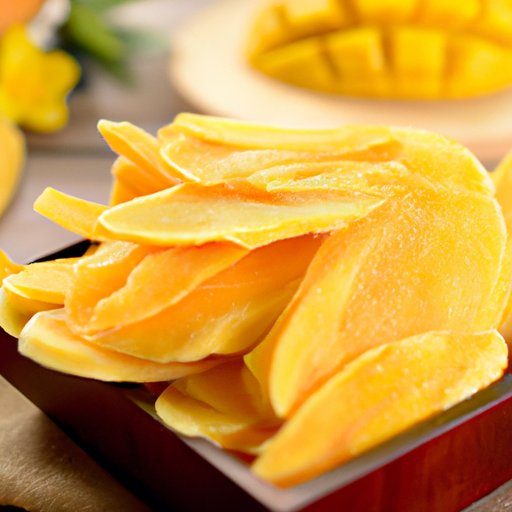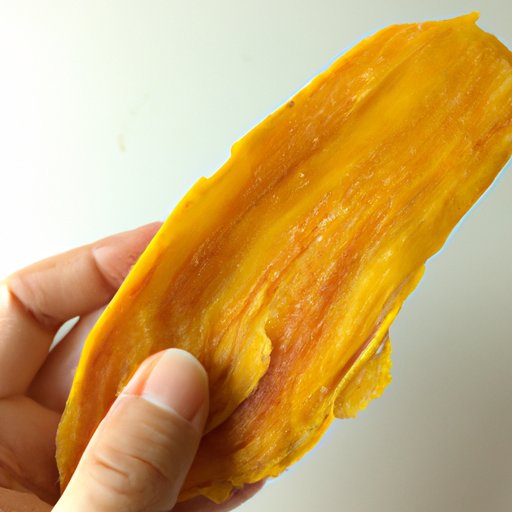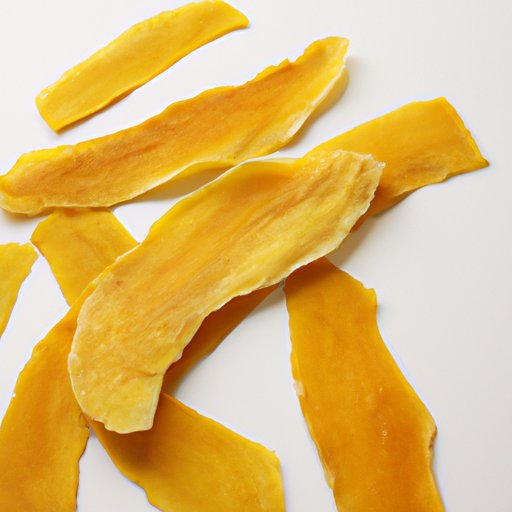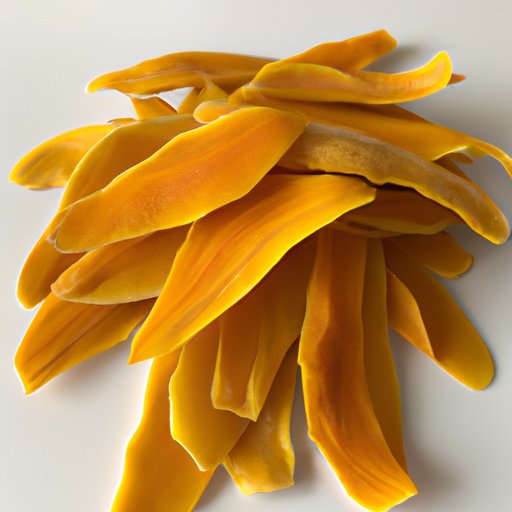Introduction
Dried mango is a popular snack that is gaining in popularity due to its sweet flavor and nutritional value. But is dried mango actually healthy? In this article, we’ll explore the nutritional benefits of eating dried mango, as well as the potential health risks associated with it. We’ll also compare fresh and dried mango to determine which is healthier.

Nutritional Benefits of Dried Mango
Dried mango is an excellent source of several essential nutrients. According to the United States Department of Agriculture (USDA), one cup of dried mango contains approximately:
- Calories: 214
- Total fat: 0.4 g
- Carbohydrates: 53.3 g
- Fiber: 4.7 g
- Protein: 1.2 g
It is also a good source of vitamins and minerals, including vitamin C, vitamin A, vitamin E, potassium, magnesium, and calcium. Additionally, dried mango is low in saturated fat and sodium, making it a good choice for those looking to reduce their intake of unhealthy fats and salt.

Health Benefits of Eating Dried Mango
In addition to its nutrient content, dried mango has several health benefits. Here are some of the most notable:
Antioxidants
Dried mango is rich in antioxidants, which are compounds that help protect the body from damage caused by free radicals. Free radicals are molecules that can damage cells, leading to inflammation and disease. Antioxidants help neutralize free radicals, reducing the risk of developing chronic diseases such as cancer and heart disease.
Digestive Support
Dried mango is a good source of dietary fiber, which is important for digestive health. Fiber helps keep your digestive system running smoothly and can help relieve constipation. The high fiber content of dried mango may also help reduce cholesterol levels and improve blood sugar control.
Improved Heart Health
The vitamins and minerals found in dried mango may help support heart health. Potassium, for example, helps regulate blood pressure levels and may reduce the risk of stroke and heart attack. Magnesium and calcium have also been shown to improve heart health.
How to Incorporate Dried Mango into a Healthy Diet
Dried mango can easily be incorporated into a healthy diet. It makes a great snack on its own, or you can add it to yogurt, smoothies, oatmeal, salads, or trail mix. You can also use dried mango in recipes such as muffins, cookies, and cakes. Here are some ideas for snacks featuring dried mango:
- Dried mango and nuts
- Dried mango and dark chocolate chips
- Yogurt parfait with granola, dried mango, and berries
- Smoothie with banana, almond milk, and dried mango
- Trail mix with dried mango, almonds, and pumpkin seeds
Comparing Fresh and Dried Mango: Which is Healthier?
When it comes to comparing fresh and dried mango, there are a few key differences. Let’s take a look at some of the most important ones:
Nutrient Comparison
Fresh mango is higher in water content than dried mango, so it has fewer calories per serving. It also contains more vitamin C and less sugar than dried mango. On the other hand, dried mango has more fiber and is higher in calories, fat, and carbohydrates than fresh mango.
Environmental Impact
When it comes to environmental impact, fresh mango is usually the better choice. Growing and shipping fresh mango requires significantly less energy than drying and packaging dried mango. Plus, since fresh mango has a shorter shelf life, it produces less food waste than dried mango.
Is Dried Mango a Good Source of Vitamins and Minerals?
Yes, dried mango is a good source of several vitamins and minerals. Here’s a look at the vitamin and mineral content of dried mango:
Vitamin Content
Dried mango is an excellent source of vitamin A and vitamin C. One cup of dried mango contains 690% of the daily recommended value of vitamin A and 33% of the daily recommended value of vitamin C.
Mineral Content
Dried mango is also a good source of minerals, including potassium, magnesium, and calcium. One cup of dried mango contains 15% of the daily recommended value of potassium, 8% of the daily recommended value of magnesium, and 8% of the daily recommended value of calcium.

Exploring the Health Risks Associated with Eating Dried Mango
Though dried mango has many health benefits, there are some potential health risks associated with it. Here are two of the most important ones to consider:
High Sugar Content
Dried mango is high in sugar, with one cup containing 28 grams of sugar. Eating too much sugar can lead to weight gain, diabetes, and other health issues. To avoid these problems, it’s best to limit your intake of dried mango and opt for fresh fruit instead.
Potential Allergen
Mango is a potential allergen for some people. If you’re allergic to mango, it’s best to avoid it altogether. Even if you don’t have an allergy, it’s still important to be mindful of your intake of dried mango, as eating too much can lead to digestive distress.
The Pros and Cons of Eating Dried Mango
When it comes to the pros and cons of eating dried mango, here’s what you need to know:
Pros
- Good source of essential nutrients
- Rich in antioxidants
- Supports digestive health
- Improves heart health
Cons
- High in sugar
- May be a potential allergen
- More expensive than fresh mango
- Less environmentally friendly than fresh mango
Conclusion
Dried mango can be a healthy snack when consumed in moderation. It is an excellent source of essential vitamins and minerals, and it provides several health benefits, including improved digestion and heart health. However, it is high in sugar and may be a potential allergen, so it’s important to be mindful of your intake. When choosing between fresh and dried mango, fresh mango is usually the better choice due to its lower sugar content and environmental impact.
(Note: Is this article not meeting your expectations? Do you have knowledge or insights to share? Unlock new opportunities and expand your reach by joining our authors team. Click Registration to join us and share your expertise with our readers.)
